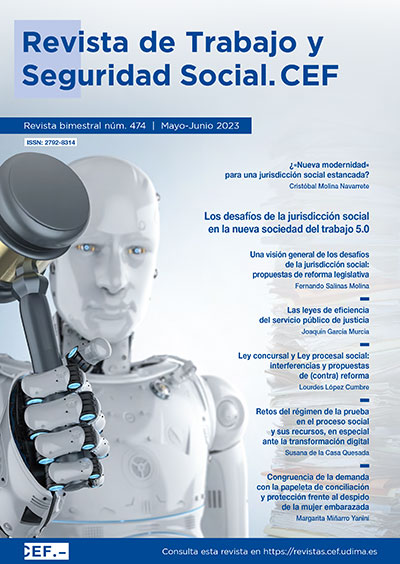La revisión de sentencias firmes como excepción a la cosa juzgada: pasado, presente y futuro de una institución de carácter restrictivo y subsidiario
DOI:
https://doi.org/10.51302/rtss.2023.18777Palabras clave:
revisión de sentencia, proceso laboral, cosa juzgada, seguridad jurídica, subsidiariedad, tutela judicial efectiva, justicia materialResumen
La cosa juzgada es sin duda la institución que representa de manera más fiel el principio de seguridad jurídica contenido entre los principios inspiradores del ordenamiento jurídico que se recogen en la Constitución española de 1978. Sin embargo, y pese a la importancia de garantizar dicho principio constitucional, nuestro ordenamiento jurídico procesal establece que en determinados supuestos existen excepciones al mismo, con la finalidad de que la realidad material prevalezca sobre la realidad procesal.
Dicho procedimiento, que se regula de forma autónoma, como un procedimiento independiente al principal, y no como una fase de recurso adicional dentro del procedimiento, tiene un carácter absolutamente subsidiario, de manera que se prevé para supuestos muy tasados que a su vez se interpretan de manera restrictiva, y que en el ámbito procesal laboral, basado en un proceso de instancia única, sustentado principalmente por los principios de oralidad, inmediación y celeridad, tiene una aplicación aún más residual.
Con el presente artículo se pretende realizar un análisis sistemático y cronológico de la aplicación que ha realizado de dicha institución la jurisprudencia laboral en el pasado y en el presente, así como una valoración de la importancia que podría tener la misma en el futuro.
Descargas
Citas
Cardenal Carro, M. (2003). La revisión de sentencias en la jurisdicción social. Aranzadi.
Casas Baamonde, M. E. (2001). La prueba en el proceso laboral tras la nueva Ley de enjuiciamiento civil y el sistema de recursos en el orden jurisdiccional social. Relaciones Laborales. Revista Crítica de Teoría y Práctica, 1, 817-857.
García Murcia, J. (2014). Virtualidad en el ordenamiento laboral de la jurisprudencia del Tribunal Europeo de Derechos Humanos. Actualidad Laboral, 6, 2.
Gutiérrez-Solar Calvo, B. (2002). El «recurso» de revisión y el carácter obligatorio de las sentencias del Tribunal Europeo de Derechos Humanos (Comentario a la STS 20 de noviembre de 2021). Relaciones Laborales. Revista Crítica de Teoría y Práctica, 1, 877-882.
Molina Navarrete, C. (2012). El sistema de recursos en el proceso social: ¿«modernización» o «autopista» para la «congestión»? Análisis de la nueva Ley de jurisdicción social. Nuevas reglas legales, nuevos problemas, nuevos retos. La Ley.
Rosado Iglesias, G. (2006). Seguridad jurídica y valor vinculante de la jurisprudencia. Cuadernos de Derecho Público, 28, 83-123. https://revistasonline.inap.es/index.php/CDP/article/view/785/840
Salinas Molina, F. (2011). Ley reguladora de la jurisdicción social: innovaciones afectantes a los medios de impugnación y a las ejecuciones. Diario La Ley, 774.
Sempere Navarro, A. V. (2001). Curso de procedimiento laboral (5.ª ed.). Tecnos.
Descargas
Publicado
Versiones
- 28-04-2023 (2)
- 27-04-2023 (1)



















